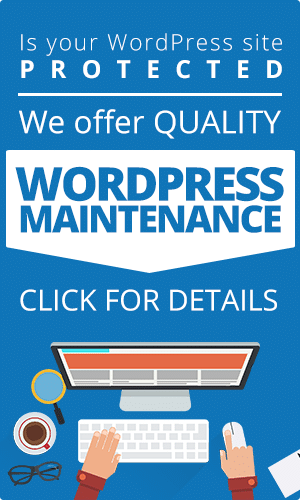What is Website Maintenance and Why Is It Important?
We all know how it is crucial to have a well-structured website. However, as it turns out, just having a website up and running is only part of the game, so to speak. A website needs to be regularly updated and actively maintained to ensure that it is running optimally. Website maintenance is a lot like maintaining your car or your property. When it is properly maintained, your website is more secure, easy for search engines to crawl through, and visitors find it easy to navigate.
As you continue to add pages like blog posts, services, etc., to your website, the more you need to ensure it (the website) is maintained because things can just as easily fall apart. Even the most popular websites often run into issues because of inadequate maintenance. For instance, you’ll at times have noticed that when you click on a link to a news article, it will take you to a 404 Error page on the news site. Regardless of how big or prominent that website maybe, that 404 Error isn’t doing them any favors. That’s why it is so important that a website be actively maintained, at least because it ensures that users have a good experience when on the site.
Website Maintenance Checklist
To give you an idea of what website maintenance entails, below is a short checklist of all the tasks a webmaster is expected to run:
- Check the site’s pages for loading errors
- Backup the website both on the server and locally
- Update all the plugins and software
- Make sure all the forms and chat boxes are running
- Remove any and all spam comments from posts or pages
- Check for 404 errors and fix
- Check and address issues related to broken links
- Draft blog posts to ensure that the community is engaged and search engines continue to take an interest in your site.
- Check and optimize the loading speed of your website
- Take a look at all the website’s statics to see if there is anything unusual
- Check Google’s Webmaster Tools for errors and recommendations
Website Maintenance Improves Security
While it does not mean your website will be un-hackable, it does mean that getting into it, i.e., hacking it, will be challenging even for an experienced pro hacker. It is important to remember that security is the one reason why website maintenance is so important. Hackers often exploit known vulnerabilities in a website that hasn’t been updated. Regardless of if your business has a WordPress website or uses some other platform, it also does not matter if you’re using plugins or are just a blog. Hackers are always searching for vulnerabilities, which is why you need to be working overtime to prevent security breaches.
Now, if you’re using WordPress or any other content management system on the backend, it is important to ensure that it is updated to the latest version. Some hosting services tend to run updates automatically, but with most others, you’ll need to actively log-in as ‘administrator’ and click on the ‘update’ button. It only takes a few minutes but will save you from a lot of issues later on.
However, updating your WordPress website is just one of the many steps you should take to secure it. We recommend running a complete website security audit and maintenance a couple of times a year. The bigger your business, the more frequently you should check for updates and invest in website maintenance because hackers have more to gain by breaching its security.
Website Maintenance Helps to Drive More Traffic
Many website owners may not know this, but website maintenance can improve your search rankings considerably. Now, many people reading this post may probably add new content, either every day or every second day, or even every week. Part of your routine maintenance should be to ensure that the content is correct and your old content is updated. The more relevant and fresh the website’s content is, the more search engines will likely rank it.
Conversely, we’ve observed that search engines tend to lower rankings if a website isn’t frequently updated. At times your website can be demoted several positions until it is entirely removed from search results.
What does all of this mean? It means that if your website hasn’t been actively maintained for maybe several years, there is a good chance that it isn’t optimized for tablets and smartphones. If a website isn’t compatible with mobile devices, search engines like Google may not consider it, severely affecting the traffic your site receives.
Mobile-friendly websites are scalable, the text is easily readable on these devices, and navigation is tailored to a smaller screen. In other words, if the website isn’t mobile-ready, you’re going to lose out on a lot of traffic and consequently business.
So, as part of your website’s maintenance, you’ll want to first make sure the site is mobile friendly. Then go to Google’s Webmaster tools and fix any errors that are reported. Make sure to continue checking back to Google Webmaster Tools at least once a month and fix all errors it reports.
Website Maintenance Can Ensure that You Have the Latest Backup of the Site and Related Files
One of the primary tasks of maintaining a website is backing up everything. You can either back up the website manually or use the web hosting service provider’s automated backup service. Every webmaster and business owner should want to ensure that their website is always backed up with the latest version. The last thing you ever want is to lose all the information on your site.
It isn’t uncommon for servers to be compromised and natural disasters to wipe out data centers, in which case the entire site will have to be rebuilt from scratch. Not only is it going to take time and money, but till the site goes back up, you’re pretty much burning time. Depending on the type of website you own, you can choose to run a backup either every second day or once a month. The rule of thumb is if your website is consistently changing with video, graphics, and new information, then back it up more frequently.
DIY Website Maintenance Vs. Hiring a Professional
Now that you know why website maintenance is essential, regardless of its size, the next question you probably have is if you should do it yourself or hire a professional? Now many people reading this would be tempted to save some money and handle the maintenance themselves. But should you? That’s a fair question considering several technical steps that need to be carried out to maintain a website. Not only does it take time, but it can also get a little complex.
Here are a couple of reasons why you might consider hiring a company for consistent website upkeep:
- A team of experts with experience maintaining websites knows what to do and how to do it. They may also know what potential issues the website can run into and help to avert them.
- You don’t need to personally spend time and effort making sure that your website is running optimally because a professional is doing everything for you. That leaves you to focus on other aspects of your business.
- Hiring an agency can also be cheaper, and the company can scale its service based on how the website grows. So, if your website grows from 50 pages to 100 pages, the company has the resources to scale its operations to meet your needs.
What To Consider When Buying a Website Maintenance Service?
Well, there are several things you’ll want to consider when purchasing a website maintenance package or service from a company, such as:
- The size of your website
- Does it serve a commercial intent or hobbyist purpose?
- Do you have customized content on the site, and if so, then how much?
- Is your business growing rapidly?
- Do you have any experience with website upkeep?
- Is the site out of date?
- Do you have the time needed to maintain the site?
Once you have answered these questions honestly, you’ll be able to determine if website maintenance is something you can easily handle. If your website is growing, with lots of dynamic content, and your business keeps you busy, then buying a website maintenance package is a no-brainer. The same goes for if you don’t have the technical knowledge to handle the required maintenance. However, if the website functions as a poster only for your business and adds no real value or you’re not monetizing it, then it would make less sense to spend money on professional maintenance. That said, you may want to consider taking your website more seriously and perhaps monetizing it.
Conclusion
Website maintenance can make or break your business. It needs to be taken very seriously, especially if it makes money by handling credit card transactions and stores users’ data. As a business, you always want to have a budget allocated for website maintenance, which should be handled professionally.






